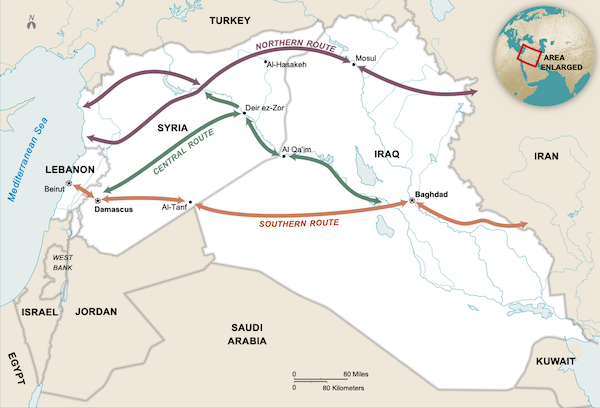Circle of Willis
Well-known member
10 years ago as of this writing, then-President Barack Obama issued his 'red line' threat - that is, if Bashir al-Assad (then fighting the early stages of the Syrian Civil War) used chemical or biological weapons against his enemies, he would provoke an American military response. A year later, the Ghouta sarin attack happened, but despite a lot of initial bluster and posturing, Obama ultimately did not deliver on the threatened military response due to a lack of support from Britain & France (key partners for the earlier intervention in Libya), Republican opposition in the House and opposition from the American public itself - even three-quarters of American soldiers didn't want to launch so much as airstrikes at Assad at the time. Russia directly intervened on Assad's side two years later and as of today, Assad remains in control of a majority of Syria's territory.
However. What if Obama, then-British Prime Minister David Cameron and then-French President Francois Hollande had resolved to push ahead with a violent intervention against Assad, not dissimilar to how they (well, substitute Sarkozy for Hollande there) had helped overthrow Libya's Muammar Gaddafi two years earlier - that is, rather than invading with ground troops, making NATO into the Syrian rebels' air force? Well of course we'd miss out on the Assad memes of the past decade. But more seriously, the Syrian opposition does not appear capable of providing sufficiently strong leadership to reunite the country & hold it together: multiple political fronts founded by anti-Assad exiles abroad have consistently failed to come together or gain any meaningful control over the actual rebel forces on the ground. Said rebels on the ground, the Free Syrian Army, was less of a cohesive faction and more a fractious coalition of Syrian Arab Army defectors and local militias who were increasingly being compromised by hardline Islamists, such as Ahrar al-Sham and Jabhat al-Nusra (AKA, literally Al-Qaeda), although to my understanding it wasn't until about 2015 that the Islamists started to completely cannibalize the less extreme outfits. The infamous ISIS is also beginning to emerge around Raqqa, where Abu Bakr al-Baghdadi has begun to make proclamations as of April 2013 (though he hasn't declared himself Caliph yet).
So, where do we go from here? Is Syria doomed to become another anarchic hellhole with open-air slave markets and perpetual civil war between warlords, as has happened to Libya, or do any of the less extreme factions have a shot at beating the long odds and leaving Syria in a better state than it was in 2011? Might ISIS actually manage to storm into Damascus in this timeline, even if they don't hold it in perpetuity? Will the West, having already seen Libya implode after they toppled Gaddafi, decide to stick around this time? What will Russia, Turkey, Israel and Iran do? How is Assad falling going to affect the migrant surges into Europe, Hezbollah in Lebanon and Israel's interests in & around the Golan Heights? There are many worms ready to jump out of this particular can, once it's opened...
However. What if Obama, then-British Prime Minister David Cameron and then-French President Francois Hollande had resolved to push ahead with a violent intervention against Assad, not dissimilar to how they (well, substitute Sarkozy for Hollande there) had helped overthrow Libya's Muammar Gaddafi two years earlier - that is, rather than invading with ground troops, making NATO into the Syrian rebels' air force? Well of course we'd miss out on the Assad memes of the past decade. But more seriously, the Syrian opposition does not appear capable of providing sufficiently strong leadership to reunite the country & hold it together: multiple political fronts founded by anti-Assad exiles abroad have consistently failed to come together or gain any meaningful control over the actual rebel forces on the ground. Said rebels on the ground, the Free Syrian Army, was less of a cohesive faction and more a fractious coalition of Syrian Arab Army defectors and local militias who were increasingly being compromised by hardline Islamists, such as Ahrar al-Sham and Jabhat al-Nusra (AKA, literally Al-Qaeda), although to my understanding it wasn't until about 2015 that the Islamists started to completely cannibalize the less extreme outfits. The infamous ISIS is also beginning to emerge around Raqqa, where Abu Bakr al-Baghdadi has begun to make proclamations as of April 2013 (though he hasn't declared himself Caliph yet).
So, where do we go from here? Is Syria doomed to become another anarchic hellhole with open-air slave markets and perpetual civil war between warlords, as has happened to Libya, or do any of the less extreme factions have a shot at beating the long odds and leaving Syria in a better state than it was in 2011? Might ISIS actually manage to storm into Damascus in this timeline, even if they don't hold it in perpetuity? Will the West, having already seen Libya implode after they toppled Gaddafi, decide to stick around this time? What will Russia, Turkey, Israel and Iran do? How is Assad falling going to affect the migrant surges into Europe, Hezbollah in Lebanon and Israel's interests in & around the Golan Heights? There are many worms ready to jump out of this particular can, once it's opened...


